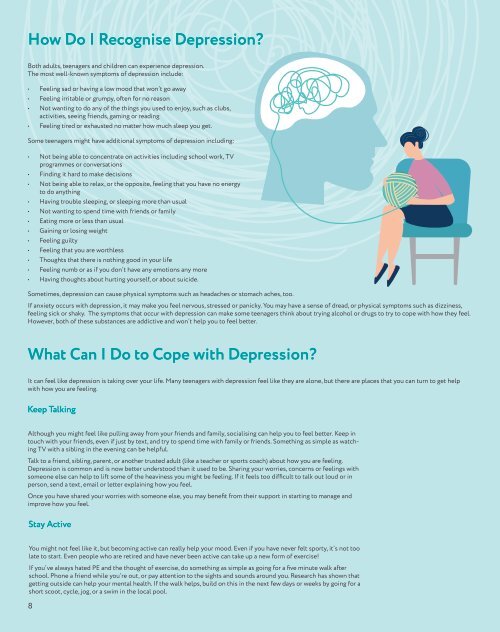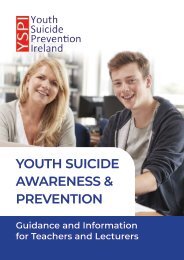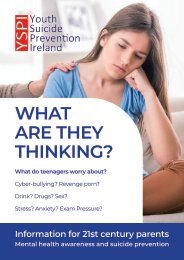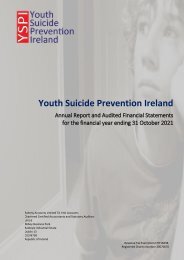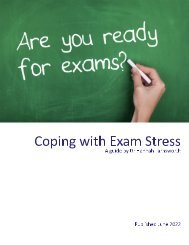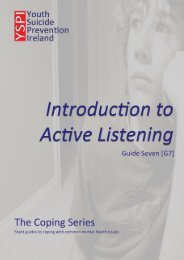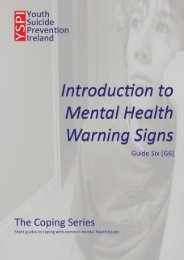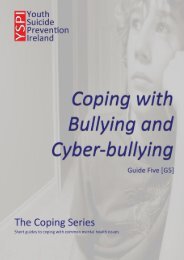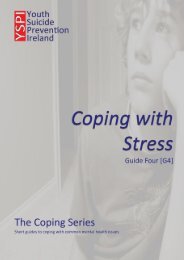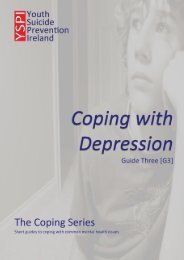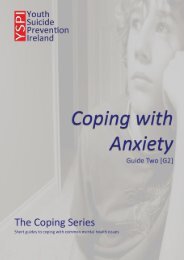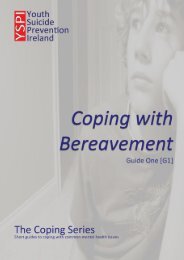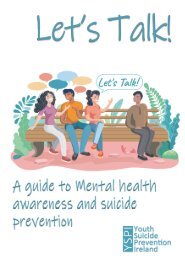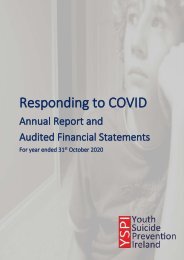Let's Talk About Mental Health
Written by Dr Hannah Farnsworth this magazine provides guidance on common mental health issues with coping strategies and support information. Topics covered include Anxiety, Stress, Depression, Bullying & Cyber-bullying, Warnings Signs of Mental Health Crises and an introduction to Active Listening. This guide is written by a registered medical practitioner and is suitable for ages 16+. Parents are advised to read the guide before letting under 16s have access.
Written by Dr Hannah Farnsworth this magazine provides guidance on common mental health issues with coping strategies and support information. Topics covered include Anxiety, Stress, Depression, Bullying & Cyber-bullying, Warnings Signs of Mental Health Crises and an introduction to Active Listening.
This guide is written by a registered medical practitioner and is suitable for ages 16+. Parents are advised to read the guide before letting under 16s have access.
You also want an ePaper? Increase the reach of your titles
YUMPU automatically turns print PDFs into web optimized ePapers that Google loves.
How Do I Recognise Depression?<br />
Both adults, teenagers and children can experience depression.<br />
The most well-known symptoms of depression include:<br />
• Feeling sad or having a low mood that won’t go away<br />
• Feeling irritable or grumpy, often for no reason<br />
• Not wanting to do any of the things you used to enjoy, such as clubs,<br />
activities, seeing friends, gaming or reading<br />
• Feeling tired or exhausted no matter how much sleep you get.<br />
Some teenagers might have additional symptoms of depression including:<br />
• Not being able to concentrate on activities including school work, TV<br />
programmes or conversations<br />
• Finding it hard to make decisions<br />
• Not being able to relax, or the opposite, feeling that you have no energy<br />
to do anything<br />
• Having trouble sleeping, or sleeping more than usual<br />
• Not wanting to spend time with friends or family<br />
• Eating more or less than usual<br />
• Gaining or losing weight<br />
• Feeling guilty<br />
• Feeling that you are worthless<br />
• Thoughts that there is nothing good in your life<br />
• Feeling numb or as if you don’t have any emotions any more<br />
• Having thoughts about hurting yourself, or about suicide.<br />
Sometimes, depression can cause physical symptoms such as headaches or stomach aches, too.<br />
If anxiety occurs with depression, it may make you feel nervous, stressed or panicky. You may have a sense of dread, or physical symptoms such as dizziness,<br />
feeling sick or shaky. The symptoms that occur with depression can make some teenagers think about trying alcohol or drugs to try to cope with how they feel.<br />
However, both of these substances are addictive and won’t help you to feel better.<br />
What Can I Do to Cope with Depression?<br />
It can feel like depression is taking over your life. Many teenagers with depression feel like they are alone, but there are places that you can turn to get help<br />
with how you are feeling.<br />
Keep <strong>Talk</strong>ing<br />
Although you might feel like pulling away from your friends and family, socialising can help you to feel better. Keep in<br />
touch with your friends, even if just by text, and try to spend time with family or friends. Something as simple as watching<br />
TV with a sibling in the evening can be helpful.<br />
<strong>Talk</strong> to a friend, sibling, parent, or another trusted adult (like a teacher or sports coach) about how you are feeling.<br />
Depression is common and is now better understood than it used to be. Sharing your worries, concerns or feelings with<br />
someone else can help to lift some of the heaviness you might be feeling. If it feels too difficult to talk out loud or in<br />
person, send a text, email or letter explaining how you feel.<br />
Once you have shared your worries with someone else, you may benefit from their support in starting to manage and<br />
improve how you feel.<br />
Stay Active<br />
You might not feel like it, but becoming active can really help your mood. Even if you have never felt sporty, it’s not too<br />
late to start. Even people who are retired and have never been active can take up a new form of exercise!<br />
If you’ve always hated PE and the thought of exercise, do something as simple as going for a five minute walk after<br />
school. Phone a friend while you’re out, or pay attention to the sights and sounds around you. Research has shown that<br />
getting outside can help your mental health. If the walk helps, build on this in the next few days or weeks by going for a<br />
short scoot, cycle, jog, or a swim in the local pool.<br />
8


